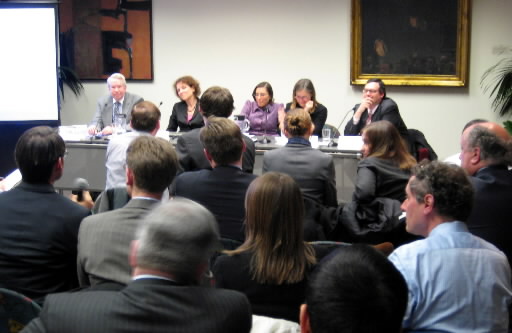Nuclear weapons can be eliminated: Chapter 1, Part 5
Mar. 15, 2009
Chapter 1: Superpower at a turning point
Part 5: Restored confidence
by Yumi Kanazaki, Staff Writer
Hopes for ratification of the Comprehensive Test Ban Treaty
Since the election of Barack Obama as president of the U.S. in November, meetings have been held throughout the country to discuss the issues facing the new administration.
Step to Zero, a debate at the Carnegie Endowment for International Peace sponsored by Physicians for Social Responsibility (PSR), an organization that advocates peace and disarmament, was held in Washington in December. There was a lively debate by four experts who serve as research experts for Congress and in other roles. These are just a few of the opinions that were expressed:
“This is a perfect opportunity to ratify the Comprehensive Nuclear Test Ban Treaty in the near future.”
“If the U.S. ratifies the CTBT treaty, the obligation of nuclear nations to disarm can be addressed squarely at the 2010 review conference of the Nuclear Non-proliferation Treaty.”
“Trust in the U.S. will be restored with nuclear disarmament.”
Jill Parillo, PSR’s deputy director for security programs, talked about the significance of holding the debate. “Now we have a chance to take the first steps toward a nuclear-free world. We would like to have more debates and offer specific proposals to Obama and Congress.”
The CTBT would ban all nuclear explosions. The treaty became a focus of the debate because if it takes effect, the development of nuclear weapons would be difficult since the treaty is expected to supplement the NPT.
In 1999, under the administration of President Bill Clinton, the U.S. Senate voted against ratifying the treaty, but Mr. Obama has taken a positive attitude. Ratification of the treaty would also give the new administration a good opportunity to demonstrate its sincere stance to the world in regard to nuclear disarmament.
David Culp is the top disarmament lobbyist for the Friends Committee on National Legislation, a Quaker organization with offices across from the U.S. Senate building. He looks at the situation this way: “The key to getting the necessary ratification of the CTBT by a two-thirds majority is how quickly and how thoroughly the administration can persuade the Senate.”
The administration’s stance on the CTBT will also foreshadow its approach to the 2010 NPT review conference.
The ground-breaking final report of the review conference in 2000 called for “an unequivocal undertaking” toward nuclear abolition, and implementation of the CTBT headed a list of 13 steps toward nuclear disarmament.
But at the subsequent 2005 review conference, the U.S. contended, along with other objections, that the agreement reached in 2000 was invalid, creating conflict with non-aligned nations and some others. That conference closed without any real agreement being reached.
Deepti Choubey, 32, deputy director of the Carnegie Endowment, said, “The U.S. underestimated how unhappy the non-nuclear nations have been with the nuclear weapon states in not fulfilling their obligations to disarm as stipulated under the NPT.”
Can the U.S. regain credibility in the international community with ratification of the CTBT in the near future? That will determine the success or failure of next year’s NPT review conference.
Comprehensive Nuclear Test Ban Treaty
The Comprehensive Nuclear Test Ban Treaty bans all nuclear explosions and creates an international monitoring system. It was adopted by the United Nations General Assembly in 1996. Its implementation is conditional on ratification by the 44 countries that have nuclear reactors or other nuclear capability. Of those, the U.S., China, Indonesia, Israel, Iran, and Egypt have signed but not ratified the treaty. India, Pakistan, and North Korea have not signed the treaty.
(Originally published on February 15, 2009)
To comment on this article, please click the link below. Comments will be moderated and posted in a timely fashion. Comments may also appear in the Chugoku Shimbun newspaper.








